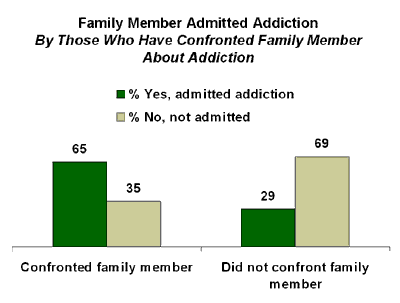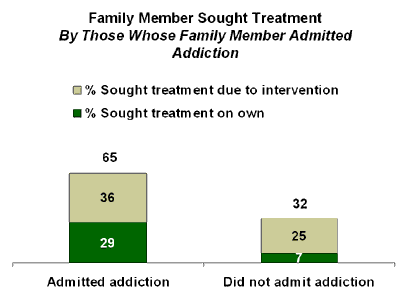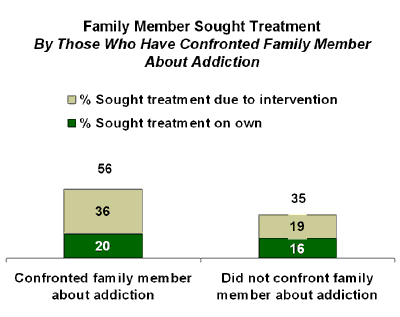GALLUP NEWS SERVICE
PRINCETON, NJ -- According to the recent USA Today/HBO Family Drug Addiction poll, only about half of Americans who have had a family member with an addiction to drugs or alcohol say their family member ever sought treatment. The vast majority of family members interviewed say their addicted relatives who sought treatment got better or completely recovered. Respondents who say their addicted relative completely recovered attribute family support or pressure, self-determination, or health scares as the major factors assisting that recovery.
In the survey, ║┌┴¤═° interviewed 902 adult Americans who indicated that an immediate family member has had an addiction to drugs or alcohol. Roughly one in five of all Americans contacted for the poll met these criteria.
More survey respondents say their family member has overcome his or her addiction (41%) than say he or she is currently addicted (30%). The remaining 29% say their family member has since died or they are unaware of their relative's current condition. The majority of respondents who say their family member is still addicted believe that he or she does not want to recover.
Would you say your "family member" is currently addicted, or has he/she been able to overcome the addiction?
(Asked of those whose family member is currently addicted) In your view, does your"family member"want to recover from his/her addiction, but is unable to do so, or does he/she not want to recover?
|
Has overcome addiction |
41% |
|
|
|
|
Currently addicted |
30 |
|
(Wants to recover) |
(11) |
|
(Does not want to recover) |
(18) |
|
(Unsure) |
(1) |
|
|
|
|
DECEASED/DOES NOT APPLY (vol.) |
21 |
|
No opinion |
8 |
One of the challenges in overcoming substance addiction is getting the person to admit he or she has a problem. The poll results underscore this. Slightly more than half of the respondents, 54%, say their family member admitted to them that he or she had an addiction. This is the case even though 69% of respondents say they have personally confronted their family member about the addiction.
Those who confronted their addicted family member were much more successful in getting him or her to admit the addiction (65%) than those who did not confront their relative (29%).

Seeking Treatment
Only about half of those surveyed, 49%, say their family member ever sought treatment to attempt to overcome the addiction. This includes 19% who say their family member sought treatment on their own, and 30% who did so because others intervened.
The poll suggests that admission can be a key factor in whether the addicted relatives sought treatment. Sixty-five percent of respondents who say their family member admitted their addiction to them say their family member sought treatment. That contrasts with 32% of respondents whose family member did not admit their addiction to them.

Similarly, those who say they confronted their family member about the problem were significantly more likely to report that their family member sought treatment (56% compared with 35% of those who did not confront their family member).

The poll makes clear the struggle that many addicts have in overcoming their addiction. Fifty-two percent of respondents whose family member sought treatment say he or she did so on multiple occasions, while 42% say their family member sought help only once.
The most common forms of treatment sought were rehabilitation or inpatient treatment centers. Seventeen percent sought treatment through formal groups, such as Alcoholics Anonymous, or similar groups. Eleven percent sought professional psychological counseling, and 8% went to hospitals.
Most of the people surveyed say their relative was addicted to alcohol (75%), with 30% saying theirs was addicted to drugs. Respondents were allowed to report multiple addictions, so the percentages total more than 100%.
Family members with an alcohol addiction were about equally likely to attend formal group meetings or to seek treatment from rehabilitation or inpatient centers. Rehabilitation was easily the most common treatment for those with a drug addiction.
(Asked of those whose family member sought treatment) To the best of your knowledge, please describe the method of treatment he/she received. [OPEN-ENDED]
BASED ON 446 RESPONDENTS WHOSE FAMILY MEMBER SOUGHT TREATMENT
|
All |
Alcohol |
Drug |
|
|
% |
% |
% |
|
|
Rehabilitation treatment center/inpatient center |
23 |
20 |
26 |
|
AA meetings/Meetings/Classes |
17 |
21 |
8 |
|
Counseling/psychologist |
11 |
11 |
13 |
|
Hospital/Medical programs |
8 |
8 |
10 |
|
Group therapy sessions |
4 |
5 |
3 |
|
Incarceration |
4 |
3 |
6 |
|
Detoxify/Dry out |
3 |
4 |
3 |
|
Halfway home/Group home |
3 |
3 |
4 |
|
12-step program |
3 |
3 |
4 |
|
Outpatient programs |
2 |
2 |
4 |
|
Saw medical doctor |
2 |
2 |
-- |
|
|
|
|
|
|
Other |
8 |
6 |
9 |
|
None |
2 |
3 |
1 |
|
No opinion |
10 |
8 |
8 |
Overcoming Addiction
The data suggest that treatment for addiction appears to produce positive results, according to those who have family experience with addiction. The vast majority of poll respondents whose family member sought treatment say that he or she got better after treatment (82%), including 38% who report their family member made a "complete recovery." Just 14% reported that their relative showed no improvement after getting help.
Poll respondents were asked for their views of the main reasons their relatives were able to overcome their addictions. The top responses were: family involvement (23%), both in terms of support of, and pressure on, the addicted family member; self-determination or willpower (15%) on the part of the addicted family member; and health reasons (12%) including life or death experiences.
(Asked of those whose family member overcame addiction) In your opinion, what would you say was the main reason your "family member" was able to overcome his/her addiction? [OPEN-ENDED]
BASED ON 371 RESPONDENTS WHOSE FAMILY MEMBER OVERCAME ADDICTION
|
Family support/pressure |
23% |
|
Self-determination/Willpower |
15 |
|
Health reasons/Life or death experience |
12 |
|
Spiritual awakening |
6 |
|
Received professional treatment |
6 |
|
Acknowledged had a problem |
6 |
|
Support/Help/Intervention of others |
6 |
|
In trouble with the law/Incarcerated |
5 |
|
Change of environment/Removal of temptation |
4 |
|
Hitting rock bottom |
3 |
|
Jobs/Financial loss |
3 |
|
Outgrew it |
3 |
|
Made a choice that had to be made |
1 |
|
|
|
|
Other |
2 |
|
No opinion |
5 |
Survey Methods
These results are based on telephone interviews with a randomly selected national sample of 902 adults, aged 18 and older, with an immediate family member who has had a drug or alcohol addiction. Interviews were conducted April 27-May 31, 2006. For results based on this sample, one can say with 95% confidence that the maximum error attributable to sampling and other random effects is ┬▒4 percentage points. In addition to sampling error, question wording and practical difficulties in conducting surveys can introduce error or bias into the findings of public opinion polls.
Next,
19. Has your "family member" admitted his/her addiction to you, personally, or not?
Did your "family member" admit his/her addiction to you, personally, or not?
|
Yes |
No |
No |
|
|
|
|
|
54% |
45 |
1 |
20. Have you, personally, ever confronted your "family member" about his/her addiction, or not?
|
Yes |
No |
No |
|
|
|
|
|
69% |
31 |
1 |
21. Would you say your "family member" is currently addicted, or has he/she been able to overcome the addiction?
|
Currently |
Has |
DECEASED/ |
No |
|
|
|
|
|
|
30% |
41 |
21 |
8 |
|
(vol.) = Volunteered response |
|||
22. (Asked of those whose family member is currently addicted) In your view, does your"family member"want to recover from his/her addiction, but is unable to do so, or does he/she not want to recover?
BASED ON 272 RESPONDENTS WHO SAY THEIR FAMILY MEMBER IS CURRENTLY ADDICTED
|
Wants |
Does not |
No |
|
|
|
|
|
36% |
59 |
6 |
COMBINED RESPONSES (Q.21-22): BASED ON FULL SAMPLE
|
Has overcome addiction |
41% |
|
|
|
|
Currently addicted |
30 |
|
(Wants to recover) |
(11) |
|
(Does not want to recover) |
(18) |
|
(Unsure) |
(1) |
|
|
|
|
DECEASED/DOES NOT APPLY (vol.) |
21 |
|
No opinion |
8 |
|
(vol.) = Volunteered response |
|
23. Which of the following applies to your "family member" -- he/she sought treatment, including joining a formal recovery program, for his/her addiction on his/her own, he/she sought treatment, but only because others intervened, or he/she has never sought treatment for his/her addiction?
|
Sought |
Sought |
Never |
No |
|
|
|
|
|
|
19% |
30 |
47 |
4 |
24. (Asked of those whose family member sought treatment due to the intervention of others) Were you, personally, involved in the intervention that led to your "family member" seeking treatment, or did he/she seek treatment due to the involvement of other people?
BASED ON 275 RESPONDENTS WHO SAY FAMILY MEMBER SOUGHT TREATMENT DUE TO INTERVENTION
|
Yes, |
No, |
No |
|
|
|
|
|
39% |
60 |
* |
25. (Asked of those who were involved in intervention leading to treatment) When you first tried to find treatment for your "family member," were you at a loss to know what to do, or did you have some idea of what to do?
BASED ON 108 RESPONDENTS WHO WERE INVOLVED IN HELPING FAMILY MEMBER FIND TREATMENT
|
At a loss |
Had |
No |
|
|
|
|
|
32% |
66 |
2 |
26. (Asked of those who have not been involved in intervention leading to treatment) If you wanted to find treatment for your "family member," do you think you would be at a loss to know what to do, or do you have some idea of what to do?
BASED ON 794 RESPONDENTS WHO HAVE NOT BEEN INVOLVED IN AN INTERVENTION LEADING TO TREATMENT
|
At a loss |
Have |
No opinion |
|
|
|
|
|
13% |
84 |
3 |
COMBINED RESPONSES (Q.25-26): BASED ON FULL SAMPLE
|
Was at a loss/ |
Had some idea/ |
No |
|
|
|
|
|
15% |
82 |
3 |
27. (Asked of those whose family member sought treatment) Was your "family member" in treatment more than once, or just one time?
BASED ON 446 RESPONDENTS WHOSE FAMILY MEMBER SOUGHT TREATMENT
|
More |
Just |
No opinion |
|
|
|
|
|
52% |
42 |
6 |
28. (Asked of those whose family member sought treatment) To the best of your knowledge, please describe the method of treatment he/she received. [OPEN-ENDED]
BASED ON 446 RESPONDENTS WHOSE FAMILY MEMBER SOUGHT TREATMENT
|
Rehabilitation treatment center/inpatient center |
23% |
|
AA meetings/Meetings/Classes |
17 |
|
Counseling/Psychologist |
11 |
|
Hospital/Medical programs |
8 |
|
Group therapy sessions |
4 |
|
Incarceration |
4 |
|
Detoxify/Dry out |
3 |
|
Halfway home/Group home |
3 |
|
12-step program |
3 |
|
Outpatient programs |
2 |
|
Saw medical doctor |
2 |
|
|
|
|
Other |
8 |
|
None |
2 |
|
No opinion |
10 |
29. (Asked of those whose family member sought treatment) What was the result of this treatment? Did your "family member" - [ROTATED: completely recover from his/her addiction, get better, but not completely recover, or did he/she show no improvement in his/her condition]?
BASED ON 446 RESPONDENTS WHOSE FAMILY MEMBER SOUGHT TREATMENT
|
Completely |
Got better, not |
Showed no |
No |
|
|
|
|
|
|
38% |
44 |
14 |
4 |
31. (Asked of those whose family member overcame addiction) In your opinion, what would you say was the main reason your "family member" was able to overcome his/her addiction? [OPEN-ENDED]
BASED ON 371 RESPONDENTS WHOSE FAMILY MEMBER OVERCAME ADDICTION
|
Family support/pressure |
23% |
|
Self-determination/Willpower |
15 |
|
Health reasons/Life or death |
12 |
|
Spiritual awakening |
6 |
|
Received professional treatment |
6 |
|
Acknowledged had a problem |
6 |
|
Support/Help/Intervention of others |
6 |
|
In trouble with the law/Incarcerated |
5 |
|
Change of environment/Removal of temptation |
4 |
|
Hitting rock bottom |
3 |
|
Jobs/Financial loss |
3 |
|
Outgrew it |
3 |
|
Made a choice that had to be made |
1 |
|
|
|
|
Other |
2 |
|
No opinion |
5 |
32. Can you please tell me what substance or substances your "family member" is/was addicted to? [OPEN-ENDED]
|
Alcohol |
75% |
|
Cocaine |
15 |
|
Marijuana |
14 |
|
Methamphetamines/crystal meth |
7 |
|
Heroin |
4 |
|
Painkillers |
5 |
|
Prescription drugs |
2 |
|
LSD/hallucinogenic drugs |
1 |
|
Sleeping pills |
1 |
|
Drugs (non-specific) |
1 |
|
Ecstasy |
1 |
|
|
|
|
Other |
4 |
|
Anything/everything |
1 |
|
No opinion |
4 |
|
|
|
|
NET: Illegal drugs |
30 |
|
NET: Legal/prescription drugs |
6 |
|
Percentages add to more than 100% due to multiple responses. |
|